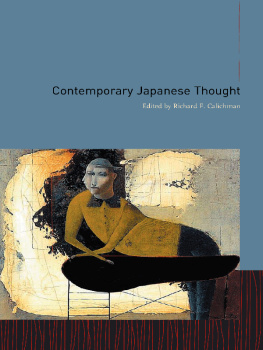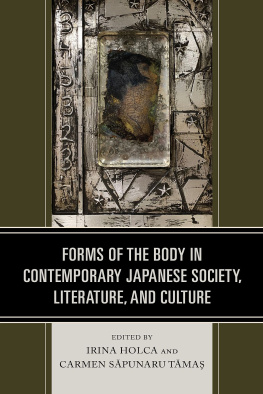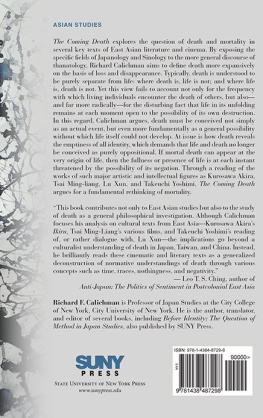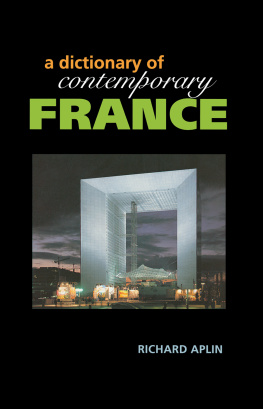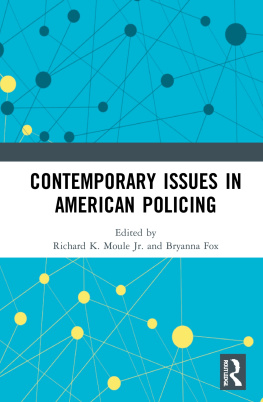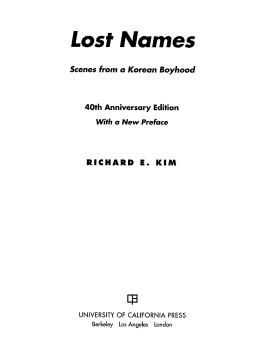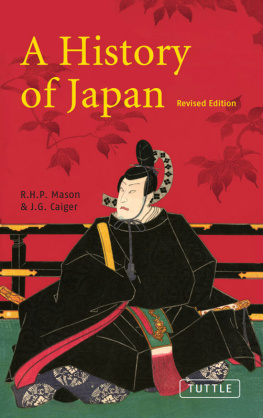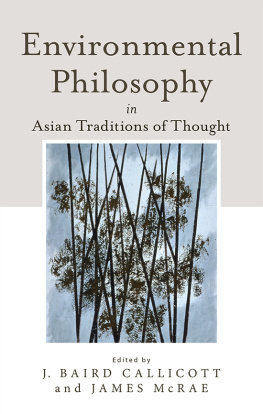Contemporary Japanese Thought
WEATHERHEAD BOOKS ON ASIA
WEATHERHEAD BOOKS ON ASIA
Columbia University
LITERATURE
David Der-wei Wang, Editor
Ye Zhaoyan, Nanjing 1937: A Love Story, translated by Michael Berry Makoto Oda, The Breaking Jewel, translated by Donald Keene
Han Shaogong, A Dictionary of Maqiao, translated by Julia Lovell
Takahashi Takako, Lonely Woman, translated by Maryellen Toman Mori
Chen Ran, A Private Life, translated by John Howard-Gibbon
Takeuchi Yoshimi, What Is Modernity? Writings of Takeuchi Yoshimi, translated by Richard Calichman
Eileen Chang, Written on Water, translated by Andrew F. Jones
David McCann, editor, The Columbia Anthology of Modern Korean Poetry
Amy D. Dooling, editor, Writing Women in Modern China:
The Revolutionary Years, 19361976
HISTORY, SOCIETY, AND CULTURE
Carol Gluck, Editor
Michael K. Bourdaghs, The Dawn That Never Comes:
Sihimazaki Tson and Japanese Nationalism
Contemporary Japanese Thought
Edited by Richard F. Calichman
COLUMBIA UNIVERSITY PRESS
NEW YORK
Columbia University Press
Publishers Since 1893
New York Chichester, West Sussex
cup.columbia.edu
Copyright 2005 Columbia University Press
All rights reserved
E-ISBN 978-0-231-50988-6
This publication has been supported by the Richard W. Weatherhead Publication Fund of the East Asian Institute, Columbia University.
Library of Congress Cataloging-in-Publication Data
Contemporary Japanese thought / edited by Richard F. Calichman.
p. cm.(Weatherhead books on Asia)
Includes bibliographical references and index.
ISBN 023113620X (cloth : alk. paper)
ISBN 0231136218 (pbk. : alk. paper)
ISBN 023150988X (elec.)
1. JapanCivilization1945
I. Calichman, Richard. II. Series.
DS822.5.C656 2005
952. 04dc22 2004065672
A Columbia University Press E-book.
CUP would be pleased to hear about your reading experience with this e-book at .
CONTENTS
This book is above all the product of several friendships begun while I was conducting postdoctoral research in Tokyo from the years 1999 to 2001. Nishitani Osamu (Tokyo University of Foreign Studies) was kind enough to act as my adviser during this time. In addition to the various seminars offered by Professor Nishitani, I also attended those given by Takahashi Tetsuya (University of Tokyo) and Ukai Satoshi (Hitotsubashi University). These seminars were a source of great inspiration for me, and I am happy to thank Professors Nishitani, Takahashi, and Ukai for discussions that took place both within and outside of them. I would also like to express my gratitude to Professor Iwasaki Minoru (Tokyo University of Foreign Studies), whose Hegel seminar with its unorthodox mixture of Japanese, German, and French remains a model for me of intellectual inquiry and camaraderie.
More generally, I am grateful to all of the books contributorsin addition to those named here, Professors Ehara Yumiko, Kang Sangjung, Karatani Kjin, and Ueno Chizukofor their generous participation in this project. I am no less thankful to the translators of these essays for their fine work here.
This project would not have been possible without the work of Naoki Sakai, with whom I first began reading contemporary Japanese thought. Carol Gluck has provided consistent support for this project, and I am indebted to her kindness. This work has also benefited from two reviewers, one of whom remains anonymous; the other, Mark Anderson, read the manuscript carefully and offered suggestions and encouragement, both of which were quite welcome. Takeshi Kimoto performed a valuable service in checking over several translations with his usual expertise. Finally, thanks go to Madge Huntington of the East Asian Institute at Columbia University and Jennifer Crewe of Columbia University Press.
The book is dedicated to M: xiexie.
A book on contemporary Japanese thought might at first glance appear surprising, given that thoughtor theory, as it is often calledhas in the modern era generally been linked with the West as its proper provenance. One readily speaks, for example, of French theory or German theory, and these references are more or less directly understood without raising much question. Despite the presence of numerous theoretical writings by so-called non-Western thinkers in non-Western languages, these texts have hitherto done little to drive a wedge between the notions of West and thought, thereby provoking discussion as to the meaning of these terms both in themselves and in combination with one another. The question arises, then, as to how to best categorize or classify such concrete examples of modern non-Western thoughtfor surely academia has thus far appeared unwilling to grant currency to such categories as, say, Chinese theory or Indian theory. Rather the common response to these texts has been to see them as necessarily derivative of the West, such that the West retains its position as the center of intellectual production and the non-West becomes the mere recipient of that influence. Even in the field of Asian Studies, the notion of Western theory has gone largely unchallenged. The question has not been whether this term any longer makes sense, if indeed it ever did, but rather whether such thought or theory can legitimately be applied to Asian texts, as these latter are assumed to be inherently devoid of any theoretical properties.
In other words, theoretical readings of non-Western works are still in many cases seen to be misreadings, since the application of Western theory presumably brings to these texts certain abstract elements that are strictly foreign to them. Now this assumption is problematic for several reasons, but it is especially so in the case of Japan. For the fact is that modern Japanese thought has long been at the forefront of theoretical inquiry and scholarship. In this context, it is perhaps important to recall that Japanese thinkers have since the beginning of the twentieth century participated in the latest philosophical developments in, for example, phenomenology, life-philosophy (Lebensphilosophie), dialectics, and hermeneutics. Much of this work coalesced around the group of philosophers collectively known as the Kyoto School, as led by Nishida Kitar (18701945) and Tanabe Hajime (18851962). This group, although highly diverse in nature, set forth many important insights regarding the status of such notions as history, praxis, technology, aesthetics, and religion. But from todays standpoint, it is arguably the study of the relation between subjectivity and negativity that has come to be regarded as their most significant intellectual legacy. While it is not the aim of this introduction to examine the achievements of the Kyoto School, it should be mentioned that these philosophers were, in one way or another, invariably confronted with the question of their own positionality vis--vis Western thought. The secondary scholarship on modern Japanese philosophy has followed this lead, as can be seen in the representation of the texts of the Kyoto School as striving for a dialogue or even synthesis between East and West, the former determined primarily along the lines of Zen Buddhism and the latter in terms of the grand philosophical tradition that stretches from Plato to Heidegger. From our own perspective, however, there seems to be little reason to determine thought on the basis of its geographical or cultural background. This point will be more fully explored in the following pages, but for the moment it is sufficient to note that contemporary Japanese thought can trace its beginnings back not only to previous Western thinkers and traditions, but also to those of Japan. Indeed, given the extreme complexity and convoluted nature of such affiliations, it might be worthwhile to question the very possibility of assigning to thinkers and their thought any fixed regional properties.



